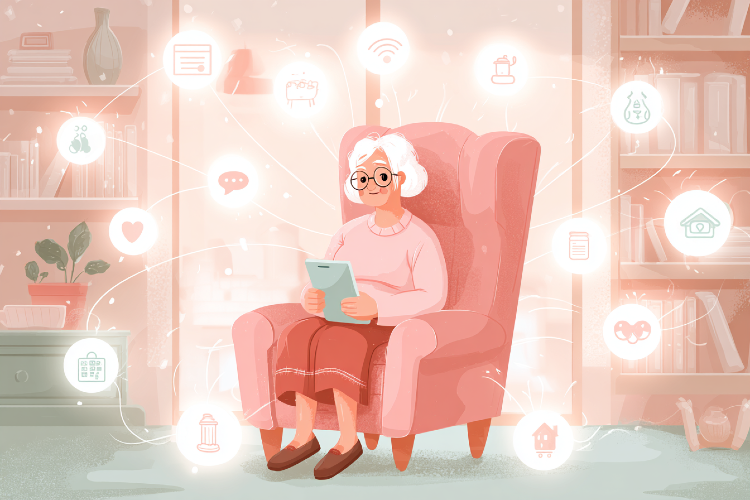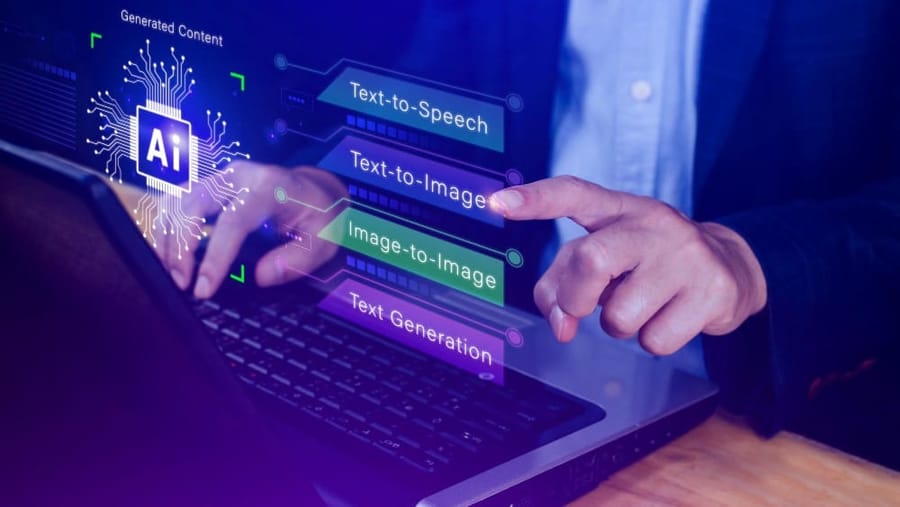Artificial Intelligence is no longer science fiction, but is now becoming a part of everyday living that can potentially enhance the lives of older adults. In a recent study, it was found that 55% of older adults said that they used some type of AI technology, and AI use among adults over 50 increased from 9% to 18% in the past year. This guide will walk you through the process of knowing how to safely use AI tools to improve your daily life, stay independent, and communicate with others.
Before talking about specific programs, it is important to discuss what is AI.
Think of artificial intelligence as really smart. Digital assistant with a good grasp of human language, able to answer questions, and perform tasks. You don’t have to know or understand the technology behind it, just like you don’t have to understand how electricity works in order to turn on the light switch.
Contemporary AI tools are built to be straightforward and user-friendly. Artificial Intelligence has the ability to sift through data on the internet, learning from data and interactions. The benefits of these tools are personalized responses; the difference being these tools are designed to help you and improve your ‘super powers’ not replace your own reasoning and relationship building.
What Should Seniors Know About AI?
Like many things, seniors do not need to know much about AI. Generally speaking, AI is software that learns, makes guesses or predictions, and engages in responsive and natural (links to imaginatively engaging) back-and-forth. These systems have been trained on a large corpus of information, allowing them to provide answers to questions, recommendations, and general support with everyday activities.

The most significant thing to understand is that AI is a tool, and it means to operate on your behalf. It can manage your day planner, alert you to medications that you’re supposed to take, respond to questions about potential health problems, and even provide a bit of companionship! This system is adaptive and will learn your needs over time, becoming even greater at helping you based on the input you provide.
Security is a true concern, and you should know that if you are using reputable AI software, it has safeguards. With that being said, don’t divulge things like social security numbers, bank account numbers, or passwords. Treat AI like you would a helpful stranger – nice and helpful, but not someone you would just tell all your private information to.
How is AI Implemented in the Elderly?
For the elderly, AI applications can be employed in various aspects of their everyday lives to provide solutions for many of the issues older populations may encounter.
Health and Wellness monitoring
AI-enabled devices, such as CarePredict, outfitted on a wrist device, track daily activities & health behaviors to note trends in health patterns that are abnormal. It can track sleep, how well, and falls can be predicted; in all cases, the total number of falls could be lowered by 69% through predictive modeling, and follow the usage of your medications. Smart watches and FitBit also use the same information, and an AI use case in how to better support your health and wellness information.
Smart Home
Voice assistance devices that are voice requesting can turn on lights and turn on thermostats or security in a few easy voice requests. Almost one in three older adults use AI-powered home security devices with 96% of them saying that they are useful. You can control temperature, turn off lights you forgot about, or check who’s at the door all without leaving your chair.
Communication and Social Connection
AI can facilitate video calls with auto captions, language translation, and simple interfaces to stay connected with family members across distances. These devices can transcribe phone calls, allowing people with hearing impairments to easily interact with others. AI can recommend the best times to call loved ones based on time zones and individual schedules.
What Is the Best AI for the Elderly?
There are several AI application tools for older adults that have become extremely useful, and they serve various needs and demands.

Voice Activation Assistants
Amazon Alexa, Google Assistant, and Apple Siri offer easy and fast handsfree access and are ideal for older adults with movement disabilities. These devices can set medication reminders, play music, tell you the weather, and answer questions without significant navigation. You talk to them relatively naturally, and they will respond in a way that is generally useful. You can ask them to call relatives, read audiobooks to you, or tell you a joke to improve your mood.
AI Companions
ElliQ and other robots that are designed specifically for companionship have received amazing success, where studies have shown an 80% reduction in loneliness after one year, and daily interactions up to 20 times a day. These companions can engage you as well as remind you regularly with gentle nudges along the way to participate in self-care. Companions learn over time to recall your preferences and recommend various activities you may like to do, whether it is a brain game or a playlist of songs.
Utilize Health Management Tools
AI-based health management platforms can predict up to 80% of health risk before it occurs, leading to 20% less falling and 70% less hospitalizations among older adults. These platforms connect with existing medical devices, provide health tracking. They meet or exceed existing vitals, provide irregularities, and contact you or your physician if something requires attention.
How Can Seniors Use ChatGPT?
ChatGPT is among the easiest AI applications for seniors to access; they need nothing more than a computer or smartphone to use it.
Setup
The easiest way for you to get started with ChatGPT is go to chat.openai.com and create free account from your email. The ChatGPT interface is extremely easy to use; you can ask questions exactly how you would ask another person. You do not have to know any special commands or tech terms, etc. Simply type or write your question like you were asking someone in plain English. ChatGPT will respond helpfully.
Use Cases
ChatGPT has many uses for improving daily living. If you need help writing, you can ask ChatGPT to help you draft letters, thank you notes, and emails, all with correct grammar and tone. If you are ever confused about what to say, ChatGPT can propose versions of what you wish to communicate (fun, tone, etc), while maintaining your own style.
If you wish to gather information, ask questions to get simplified explanations regarding medical terminology, current events, or complex subject matters without scrolling through 3-4 websites. ChatGPT can recast complicated ideas into plain language that explains difficult subjects, which can be especially useful if you are learning about recent technological advances, intermixed with complicated bills or documents, etc.
Creative projects are accessible too.
Seek out inspiration for recipes from anything in your pantry, check out classic songs or tell stories your grandparents told you. Whether you're seeking to explore long-forgotten family recipes or a new twist on a family favorite, ChatGPT can help.
Learning assistance
ChatGPT can help explain new technology or give step by step instructions for completing an activity, or you can do brain puzzles such as trivia or word puzzles. So, if you’re still figuring out your new smartphone or are stumped on a crossword!
Now on to safety.
Do not share private information with AI Chatbots. Such as social security or bank account numbers or passwords. However, always verify important medical or financial advice with a trusted human source. AI can provide some accurate advice and be suitable as a resource, but do not regard it a substitute for professional advice from certified medical, financial and legal professionals.
What are the Disadvantages of AI for the Elderly?
While there are many benefits of AI, there are also risks and challenges of AI, so you will be smart about it.

Privacy and security issues.
Many AI systems collect or analyze personal information, so privacy issues are important for older adults. There are many risks (there is a likelihood of a data breach, identity theft, or hacked private data online). And for older adults with very limited ability to go online, the information about privacy issues are often complicated and hard to set up the privacy settings. So know who you share with, and what you share!
Addressing the Digital Divide and Accessibility Problems
There are many seniors who do not have reliable access to the internet, modern devices or the digital skills to use Artificial Intelligence tools successfully. In this way, this technology gap may also keep older adults from taking advantage of Artificial Intelligence innovations and may even worsen social inequities that already exist. Price or cost is also a barrier to many seniors and may limit their access as some cutting-edge Artificial Intelligence tools require subscriptions or pricing tiers or require expensive hardware.
Over-reliance Risk
The extent of the use of Artificial Intelligence technology may foster social isolation and living without habitual human interfacing. There is concern that Artificial Intelligence friends will replace friendship which is different from acquaintance or supplement good relationships and friends, not minimalize them. Even if Artificial Intelligence knows when to speak and can provide conversation and reminders, it will never replace the value of the warmth and understanding of real people.
Accuracy and Reliability Risks
Artificial Intelligence computational systems make mistakes providing faulty information or biased decisions when trained on corrupt materials. In terms of healthcare, depending on an Artificial Intelligence piece will bring chances of incorrect diagnosis or misinterpretation of symptoms. It is incumbent on professionals to verify medical, financial, or legal advice.
How is AI Used in Elderly Care?
The elderly care field has started to embrace Artificial Intelligence technologies in order to respond to staffing shortages of caregivers and overwhelmed care situations. The global Artificial Intelligence in elderly care market reach dimension was $34.42 billion in 2024 and is expected to reach $208.59 billion by 2032.

Professional Care Environments
Artificial Intelligence can deploy monitoring systems in register or care facilities in detecting a fall, unusual behaviors, or a health emergency automatically. These monitoring systems issue a notice of which resident requires immediate attention and which residents can stay sleep. Cameras with monitoring Artificial Intelligence capability can identify if someone has fallen or is in distress and, in turn, issue a timely notice without anybody having to view the feed.
Remote Care Management
Predicative analytics to healthcare providers behaving like early warning monitors so providers can prevent major health issue prior to its onset. Telehealth or telemedicine applications incorporate Artificial Intelligence in to monitor or respond with the registered senior or adult aging-in-place. AI dashboards provide family updates whenever the registered adult aging-in-place requires monitoring, thereby supported family concern for care recipients well being.
How Do Seniors Feel About AI?
Research indicates older adults have a variety of views towards AI. A thorough study revealed elderly adults display curiosity, skepticism, and measured optimism for AI applications.
Positively
Older adults see AI as an option to increase independence and safety. Research shows that older adults that utilize AI in their home, value its ability to promote autonomy. For example, users of ElliQ were found to have positive experience scores significantly higher than average—a majority of those who used the system, identified that they viewed the friendly AI companion as a friend—a substantial improvement over other technologies.
Concerns and Hesitations
However, 46% of seniors express very low or no confidence in AI based information. Other aversions include privacy violation, loss of human connections, and concern over being supplanted. For others, the AI’s complexity may be overwhelming, reducing one’s ability to have control over decisions about one’s own care.
Acceptance Behaviors
Evidence suggests older adults are more apt to accept AI tools with discusses with designs, education, and maintain choice in the technology use. Trust in products is built over time with experiences and by having tangible reasons to use the solution.
Summary: Use AI with confidence
AI tech provides exceptional opportunities for older adults, whether it’s health monitoring or reducing social isolation. The strategy is to use it thoughtfully, trying it on with little devices first with gradual increase in use as towards confidence build.
AI is to assist and not supplant human relationships and judgment. Pick a place to begin – it might be with a voice assistance for basic question, or a Health Monitoring App the doctor recommended. Explore, use training resources, ask family members to help, and reach out to senior centers and organizations that provide technology-based resource assistance.
The future of aging includes using AI to aid independence, health, and relationships as a companion. With an understanding of both benefits and limits, seniors can assess what AI tools could possibly contribute to quality of life but not at the expense of core human values.




